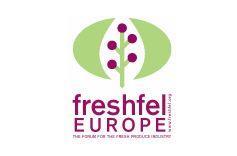
European fresh produce association Freshfel has looked to improve the position of EU fresh produce on the Russian market by presenting a strong delegation of members at World Food Moscow in Russia.
Freshfel has been at the event, which took place on 14-17 September, with a view towards preparing for next season and addressing current difficulties such as the weakening of the rouble and some specific market access concerns.
The association's export division held several meeting with representatives of the EU delegation to exchange and coordinate positions between exporters from across Europe and EU officials, with export division chairman Daniel Corbel highlighting recent positive changes in Russian MRLs.
'We welcome the latest changes in the Russian MRL as Russia is now aligning its MRL legislation with international standards and even harmonising its levels to those of the EU,' he said. 'Several difficulties remain for European exporters which need to be addressed such as the lack of transparency in a changing legislative environment, high or differentiated duties, an insufficient credit insurance scheme, the limitation of laboratories accredited for issuing safety certificates and some pending cases in regard to the MRL and nitrates dossier.'
Despite these issues, the Russian market remains the leading export destination for EU-grown fresh fruit and vegetables, with close to 2m tonnes worth over €1.4bn heading to the country – representing respectively 55 per cent of volume and 33 per cent of value of EU agricultural products shipped to Russia.
Paco Borras, Freshfel's export division vice-president, stressed the quality assets of EU fresh produce in the Tasty Europe symposium, organised by the European Commission at World Food Moscow.
'European produce adheres to strict growing conditions enshrined in legislation and further reinforced by certification schemes on GAP (Good Agricultural Practice), GDP (Good Distribution Practice) or CSR (Corporate Social Responsibility),' he told delegates. 'Based on these assets, European produce is well positioned to enhance consumption on the expanding Russian market.'
This quality is one of the factors that helps maintain growth potential in Russia, with Freshfel's general delegate pointing to some of the schemes that could help highlight this in the country.
'To assist this growth, several members of Freshfel are embarking on promotion programmes co-financed by the EU to show the value of European produce on the Russian market,' he said.



